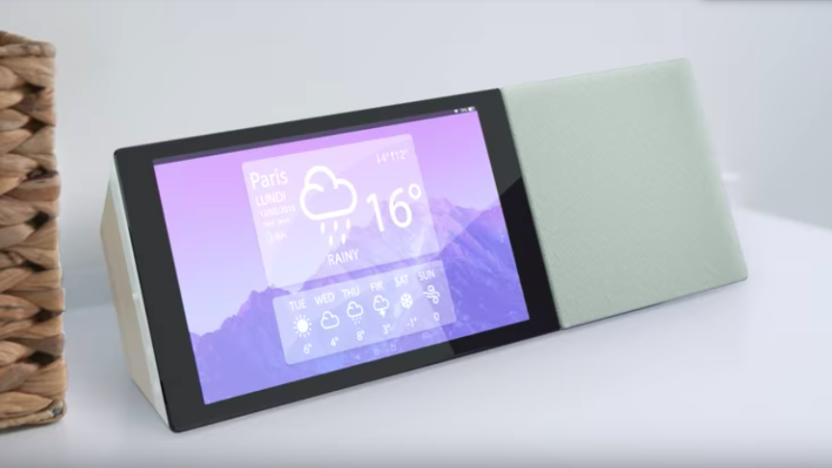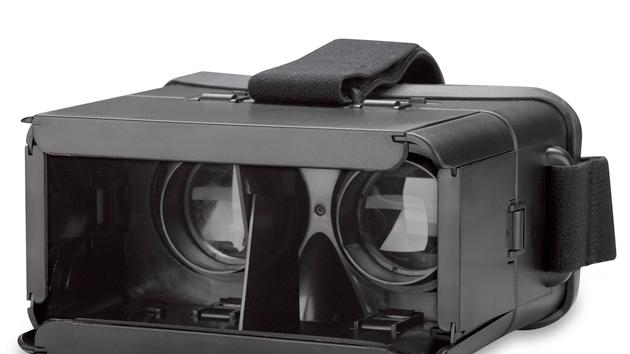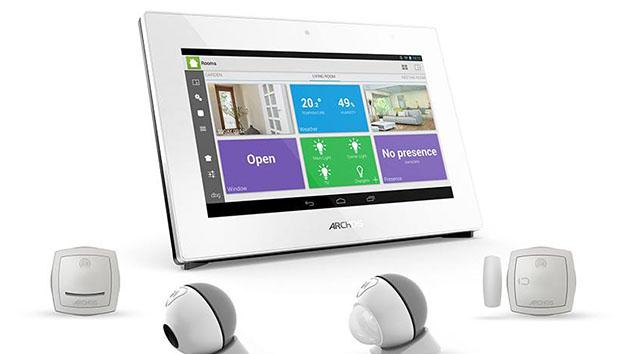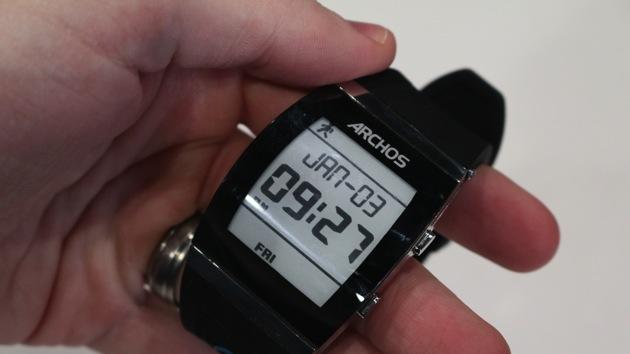archos
Latest

Archos' 'Hello' smart displays are powered by Google Assistant
As Google Assistant continues to get smarter every day, more and more companies are making hardware that's compatible with the platform. The latest one is Archos, which has introduced a couple of Google Assistant-powered smart displays at MWC 2018, adequately dubbed "Hello." Like with other similar products, you can use the Hello display to ask Google for a variety of things, such as the weather, recipes or news. The benefit here of course, compared to something like the Home Mini, is that you can actually view your search results on a screen, as opposed to just hearing what the Assistant has to say.

Archos' electric scooter taps Android for directions
It's not just bicycle makers hoping Android will improve your two-wheeled transportation. Archos has unveiled a Citee Connect electric scooter with a 5-inch Android computer in between the handlebars. The hardware won't rival your phone (it an uses unnamed quad-core chip, 1GB of RAM and 8GB of storage), but it does have 3G built-in for directions and other tasks that might be handy while you commute around town. There's also a dedicated mobile app that can control the scooter's built-in reel lock.

Consumers are buying a super-secure phone that's not meant for them
Let's get this out of the way right up top: Sikur's GranitePhone is not for you. Security as a feature is nothing new -- BlackBerry's entire existence rests upon it at this point -- but the GranitePhone takes security to another level. While the phone is based on Android, it runs a forked version called GraniteOS that is startling in its simplicity. You can make secure, encrypted voice calls and use Sikur's encrypted chat and messaging service. There's also support for standard GSM calls and SMS messages, and you can take photos or add standard Exchange, POP or IMAP email accounts. But that's it.There's no app store or even many built-in apps for things we think of as standard smartphone features, and that's all with intention. This isn't a phone for the standard smartphone user, says Sikur CEO Fred D'Avila -- instead, his company built a phone in partnership with hardware manufacturer Archos specifically for governments, big enterprise clients and financial institutions. The challenge will be convincing those potential clients to go with Sikur and the GranitePhone over its better-known competitors.

The $850 Archos GranitePhone promises to keep all your data secure
The Blackphone isn't the only smartphone out there that has security as its number one feature. A partnership between Archos and secure software specialists Sikur has yielded the GranitePhone, a device that runs Sikur's fully encrypted GraniteOS on top of Android. As its site claims, the GranitePhone encrypts every bit of communication data on the device, including calls, messages, contacts and more. While the device has Android at its core, it doesn't look like it includes Google's service, including the Play Store -- so it's not likely to appeal to anyone except those who really put security at the forefront.

Archos is launching a GearVR competitor that costs just $40
We may not know how much GearVR will cost, but we're reasonably sure that Archos is already trying to undercut Samsung and Oculus head-mounted effort. The French company is busting out the wittily-named Archos VR Headset, a Rift-like device that's compatible with any smartphone that measures between 5 and 6-inches. The kicker here, of course, is that the device will retail for £25 in the UK, roughly converting to $40, which would put it well beneath the - frankly insane - $200 figure an unnamed Samsung official told VentureBeat during New York Fashion Week. If you're interested in trying one out, it'll be available at some point in November, and we hope that the GearVR isn't too far behind.

Archos Music Beany: A warm winter Bluetooth wearable
I live in Colorado, where it can get cold on occasion. That means that when I go for a walk in the snow or am otherwise out in chilly weather, listening to tunes can be an exercise in futility. I'll wear my Apple Earbuds under a knit hat on occasion, but I'm not a real fan of those buds anyway. So what about a warm knit hat with a pair of speakers and a Bluetooth transceiver built into it? That's the idea behind the Archos Music Beany (US$29.99), which gives you all of the connection to your music and phone of those earbuds without the wires. Specifications Dimensions: 8.7 x 9.0 x 1.2 inches (220 x 230 x 30 mm) Weight: 5 ounces (140 grams) Washable: Yes, electronics are removable Rating: IP55 (dust protected, protected against water jets) Battery: Li-Ion 3.7V/120 mAh, 6 hour talk time, charged with micro-USB cable (2.5 hour charging time) Materials: 50% acrylic, 50% polyester Design Hey, it looks like a hat my Mom would have knitted for me when I was a kid. It's warm, and the only thing that sets it apart is a tiny leather patch that goes over one ear. That patch has an LED inside, volume up/down buttons, and a play/pause button. The review hat came in basic black, but you'll also be able to get this in blue, white and grey. Function What do I want a music beany to do? Keep my ears and balding head warm, let me listen to music from my iPhone, and make and receive calls. First, it's comfortable and keeps my head warm, so in that respect, the Archos Music Beany fits the bill. I have a big head (size 7-3/4 hat), and the beany stretches easily to fit my monstrous noggin. So, how about pairing? You just press the play/pause button for five seconds, wait for the LED to flash red/blue, and then wait for Bluetooth Headwear to show up in your Bluetooth settings. Tap it, and you're connected. After this point, the LED will flash blue every five seconds to let you know that the hat is connected. Placing the hat on my head, I found that it placed the speakers directly over my ears when I had the beany on with the controls on the right side, but ahead of my ears when the controls were on the left. While the speakers don't provide what I'd exactly call the highest-quality sound I've ever heard, they do a passable job and there's surprisingly good stereo separation. The controls worked pretty well, although on occasion I would have the device accidentally jump to the next song in a playlist instead of increasing volume. How about receiving a phone call? Tapping the play/pause button is supposed to let you answer or hang up an incoming call. I'm not sure what happened when I received a call and got a loud buzzing sound in my headset instead of being able to answer it. My guess? I'm using OS X Yosemite beta, to which I can shift phone calls coming in on the iPhone. I think the iPhone was trying to "talk" to my Mac and not the headset. Conclusion With fairly good sound quality, the ability to keep your head warm in cold weather, and a relatively low price tag, the Archos Music Beany is a good and innovative idea. But be aware that while it's great for listening to music, you might find answering phone calls to be problematic, and the controls can be somewhat cranky and sometimes don't do what you want them to do. Rating: 2-1/2 stars out of 4 stars possible

Super cheap Smart Home kit brings automation to the masses
If you're wondering when home automation might tip into the Walmart-level mainstream, here's a sign: Archos' Smart Home starter kit is now on sale. Along with two cameras, two movement tags and two weather tags, they're throwing in a controlling tablet, all for $250 -- or $25 each for the cameras and sensors. Considering the tablet, that's even cheaper than SmartThings' low-end kit. Archos says it's the first to use the Bluetooth Smart tech in connected homes and engineered it to work at double the normal distance (65 instead of 32 feet) with up to 13 devices. That'll permit it to take a photo when a movement-tagged door is opened, for instance, using its scenario editor and the Tasker Android app. Archos also has controllable plug sockets, alarm sirens, motion-detectors and even a pet tracker planned for the future. The kit should hit its online shop soon, but fair warning -- Archos is known for low-priced, but not exactly high-end goods.

Archos' 6.4-inch smartphone puts the buttons on the back
When we talk about smartphones with buttons on the back of the case, most people's thoughts turn toward the LG G2. But now the French electronics outfit Archos has decided to follow in LG's footsteps with the 64 Xenon, a 6.4-inch phablet that puts both the volume and power buttons on the rear side. Packing a 1,280 x 720 IPS LCD display, dual-SIM slots and HSPA+ radios, it's clear that this is designed to square up against the likes of the Galaxy Mega, but with a much lower price tag of 200 euros (around $275).

Archos' octa-core smartphone is surprisingly quick for the price
When it comes to smartphones, hugs and all-you-can-eat buffets, more is better, right? That's why we had to sit down and play with Archos' 50c Oxygen. The gassy, Jelly Bean-running handset is one of the first to use MediaTek's 1.7GHz octa-core MT6592 CPU, housed behind a 5-inch 1,280 x 720 IPS LCD display. Archos has found room for dual-SIM slots, 1GB RAM, 8GB of onboard storage and a microSD card slot, while the 2,000mAh battery should last you at least a day.

Archos intros 8-inch Helium 4G tablet, octa-core Oxygen smartphone ahead of MWC
Even though Mobile World Congress 2014 doesn't officially kick off until February 24th, Archos has gone ahead and revealed some products it will be bringing to the event. For starters, there's the 80 Helium 4G, an 8-inch, £230 tablet that packs a Cortex-A7 quad-core processor, 4G/LTE and Android 4.3. Additionally, Archos is also introducing a 5-inch, dual-SIM smartphone called 50c Oxygen, which features a 720p IPS display, MediaTek octa-core CPU, Jelly Bean (sorry, no KitKat here) and a 6.77-mm thick body. Archos' 80 Helium 4G and 50c Oxygen won't launch until later this year, but the company is indeed planning to show them off in Barcelona -- and you know we'll be there.

Archos' Neon tablets are even more budget-friendly than usual
Archos is summoning 2011 with the specs for its new Neon tablet line.The slate trio represents the low-end of Archos' lineup, and doesn't impress in the specs department. Falling under its Cobalt and Titanium series of tablets, all three tablets come sporting a quad-core A9 processor, 1GB of RAM, 8GB of onboard storage and microSD expansion. The Neon line includes the 9-inch Archos 90 Neon with 800 x 400 display, 9.7-inch 97 Neon with 1024 x 768 display, and the 10.1-inch 101 Neon with a 1024 x 600 display. The 9.7-inch tab comes with a 2-megapixel rear-facing cam, and all three come rocking forward-facing cams. Pricing and availability has yet to be announced, but we expect these three to come soon and under $200 apiece.

Home automation is the future and Archos knows it
Yes, this is another post about the internet of things blorg -- you know, that terrible buzz phrase for this new and actually exciting era of connected gadgets. Except this time, it's brought to you by Archos. The French outfit's branching out from its traditional portfolio of Android smartphones and tablets with a new Smart Home solution -- an ecosystem that's similar to Smart Things. The platform, which Archos announced just prior to the new year, incorporates a tablet-like gateway and various sensors that users can place in and around their homes for remote monitoring. Archos is gearing this whole system more toward convenience than security and its array of Bluetooth sensors proves this point. Smart Home revolves around Archos' gateway, a 7-inch tablet that gathers and manages a feed of all the data from its various Bluetooth sensors; sensors designed to monitor video, motion, weather and electricity. Though the initial $200 kit comes with just the gateway, one video camera and one motion sensor, users can go out and buy additional sensors piecemeal for anywhere from $14 - $50 (e.g., the weather sensor costs $30).

Archos' Smartwatches don't want to be smartphones-lite
Archos is coming at the burgeoning smartwatch space in a different way. Rather than hedge its bets on a single device offering, it's planning to release a trio of smartwatches for every end of the consumer spectrum. The water-resistant smartwatches in question don't have specific branding attached as of yet -- that will presumably come before launch later this summer -- but they are easily distinguished by screen size and display tech used. Unlike the half-baked, it-can-sorta-do-everything Galaxy Gear, Archos' smartwatch line is hewing more closely to the Pebble route. These Android- and iOS-compatible devices are designed to supplement your smartphone experience, not replace it. And so, users that buy in will have access to notifications (i.e., SMS, emails, text, Twitter, Facebook, etc.), media playback controls and, of course, a clock. What they won't be able to do is snap photos on a low-resolution camera, talk into their wrists or reply to messages.

Weekly Roundup: 2013 in review, NSA iPhone hack, live at CES 2014 and more!
You might say the day is never really done in consumer technology news. Your workday, however, hopefully draws to a close at some point. This is the Daily Roundup on Engadget, a quick peek back at the top headlines for the past 24 hours -- all handpicked by the editors here at the site. Click on through the break, and enjoy.

Archos debuting two 4G smartphones at CES, priced at $200 and $250
It's not all smartwatches and weather stations for Archos this year at CES. The company may be diversifying its portfolio a bit at the show, but it's still got its hands in some tried and true categories. For starters, there are the new 45 and 50 Helium 4G handsets. Both run Android 4.3 on a 1.4GHz quad-core processor, with upcoming upgrades to KitKat (version 4.4.2). The 45 is, naturally, the lower-end of the two, featuring a 4.5-inch 854 x 480 display, 4GB of storage and a 5-megapixel rear-facing camera, priced at $200 unlocked. The $250 50 Helium 4G, meanwhile, bumps things up a bit, with a 5-inch 1280 x 720 display, 8GB of storage and an 8-megapixel rear camera. Both will be hanging out at the Archos booth in Vegas.

Archos will debut multiple 'Pebble-like' smartwatches at CES, starting at less than $50
There's one more interesting nugget in today's jam-packed Archos press release. Alongside the home tablet, scale, weather system, activity monitor, et al. is a very brief mention of a smartwatch -- a "selection of" smartwatches, actually. There's not much info here, save for the fact that at least one of the wearables will hit an under-$50 price point. The company is also apparently comparing the iOS/Android-compatible line to a familiar wearable, referring to it as "pebble-like" in the included press material (lower case, mind). If we had to venture a guess, we'd say the similarity comes from what looks to be an e-ink or e-ink-like display, but it looks like we're going to have to jump on a plane to Vegas to find out for sure.

Archos previews connected home, health monitoring devices ahead of CES
Archos looks to be getting in on the New Year's resolutions a bit early. The company clearly couldn't wait for CES to spill the beans on its 2014 lineup -- at least so far as connected devices are concerned. The device maker wants to make you a part of its internet of things, previewing a slew of devices, including an activity tracker, scale, blood pressure monitor, weather station and tablet. There is, predictably, not a whole heck of a lot of information on any of the products -- in fact, the company's managed to shove mentions of all of the above into a single press release issued a little more than a week out from the big Vegas event. Archos is collectively referring to the lineup as its "connected objects" -- devices that are monitorable in real-time via Android and iOS apps. There's not much to say about the 7-inch Smart Home Tablet, at the moment. The company's positioning the Android device as a "gateway" to connected home actions, like turning on lights and recording video with a mini-cam when a motion sensor is triggered. CES will also see the debut of a new Weather Station from Archos, offering up indoor and outdoor temperature, humidity, CO2, pressure and other readings, along with national and historic levels for comparison. The company's Connected Self app, meanwhile, was built to work with a handful of new health devices. The list includes a connected scale that tracks body fat, an activity tracker that measures footsteps and burned calories and a blood pressure monitor that comes with an irregular heartbeat detector.

Quechua's new smartphone aims to tag along on your next wild adventure
Even though it is a pretty populated world already, Quechua wasn't going to let that interrupt the (rugged) vision for a smartphone of its own. The company, which is known for selling mountain sports gear and equipment, has partnered with Archos to introduce the Quechua Phone, a 5-inch handset with Android 4.1. Aside from packing ruggedized traits such as IP54 certification, Quechua's Phone also features a Qualcomm 1.2GHz, quad-core chip, 1GB RAM, 4GB of internal storage (expandable via microSD), a 5-megapixel rear camera and one rather beefy 3,500mAh battery. Other details like the screen's total pixel count or when/where it'll be up for grabs are still mum -- but we do know the Quechua Phone will be priced at €230 (around $310) once it eventually becomes available.

Archos 101 XS 2 tablet slides its way into US stores this December for $279
When Archos brought the original 101 XS to the US, we chastised it for pricing a basic tablet at $400; was the included keyboard worth that much? There won't be similar grousing over the 101 XS 2. The company has announced that it will launch the second-generation 10-inch device in the US this December for a budget-friendly $279 with the keyboard in the box. As in Europe, the Android 4.2 slate is a big step up over its ancestor with a quad-core 1.6GHz ARM Cortex-A9 processor, 2GB of RAM and an IPS-based 1,280 x 800 display. If you find that the Transformer Book T100 and other keyboard-equipped tablets are out of your price range, you'll only have to wait a few weeks to try Archos' cheaper alternative.

Archos unveils budget-friendly dual-SIM Titanium smartphones
Archos has revealed not one but four budget smartphones with humble specs to join its tablets in the Titanium line, making us want to break into song. The new Android Jelly Bean devices are named after their screen sizes -- models 40, 45, 50 and 53 have displays that measure 4 (800 x 480 resolution), 4.5 (854 x 480), 5 (960 x 540) and 5.3 (854 x 480) inches, respectively. They have dual SIM slots that allow them to support 850/900/1800/1900MHz GSM, as well as 900/2100 WCDMA bands, and they connect to the internet via HSDPA+/HSUPA. On the inside, you'll the find the phones running on 1.3GHz dual-core MTK6572w processors with 512MB of RAM and, sadly, only 4GB of storage that makes their microSD card slots more valuable than ever. While the devices don't boast any fancy add-ons, they at least come with 5-megapixel rear and 0.3-megapixel front cameras. Availability seems up in the air at this point, but the phones' prices will range from €100 ($137) to €160 ($219) when they come out. Those who'd like to know more about the company's new set of quadruplets can head past the break for more info.










